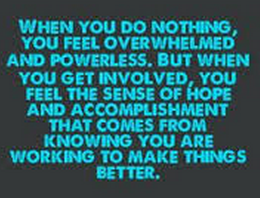Codependency.
Startling is the fact that 96% of the world is infected with this disease which can become fatal.
Codependency is marked by four characteristics:
1. We allow others to define us.
2. We allow others to determine our moods.
3. We have lost our
life of centeredness--
we are not intern-ally referented.
4. We are addicted to unhealthy rela-tionships.
To summarize, codependency is surrendering our opinions and values because we fear the anger or rejection of another.
Below is a list of traits of codependency. See if you can identify with any of them. This checklist is taken from Anne Wilson Schaef's book, p.42.
1. Not dealing with feelings in a healthy way.
a. Frozen feelings
b. Being out of touch with feelings.
c. Holding on to feelings, like resentment. This is dysreg-ulation. Our emotions respond more wildly than the triggering event normally produces.
2. Control. This is an auto-mated patterned way of responding that prevents us from experiencing our emo-tions and being present.
3. Confusion
4. Thinking Disorders
a. Over-reliance on linear, logical analytic thinking. Often this is an attempt at controlling the uncontrollable. Good luck with that.
b. Either/or thinking.
c. Obsessive thinking, ruminating.
5. Perfectionism
6. External Referenting
a. Being "other" directed.
b. Low self-worth,
c. "Impression manage-
ment"
d. Shame-based existence
7. Dependency issues
8. Fear
9. Rigidity
10. Being judgmental
11. Depression
12. Inferiority/Grandiosity
13. Self-Centeredness
14. Negativism
This post is just a start. I will return to this later. Right now, by best for today is good enough.
Please let me hear from you,
Pablo
Startling is the fact that 96% of the world is infected with this disease which can become fatal.
Codependency is marked by four characteristics:
1. We allow others to define us.
2. We allow others to determine our moods.
3. We have lost our
life of centeredness--
we are not intern-ally referented.
4. We are addicted to unhealthy rela-tionships.
To summarize, codependency is surrendering our opinions and values because we fear the anger or rejection of another.
"When the applause of others is the reason for our be-havior and necessary for us to feel good about our-selves, we have given them power over us." Courage to Change, p. 9
Codependents take on another's sadness, happiness, fear or whatever people around them are feeling or thinking.
"Our major institutions ---family, the school and the church---actively train us not to form boundaries.
"They teach us to think what we are told to think, feel what we are told to feel, see what we are told to see, and know what we are told to know. This cultural codependence train-ing.
"We learn that the reference point for thinking, feeling, seeing and knowing is external to the self. This train-ing produces people without boundaries. In order to have and experience boundaries, a person must start with an internal referent.
Soon enough, we don't even consider what we believe, or how we may see things differently. It is a natural process to not consider our needs. We have been groomed to ignore our feel-ings and wants."This is knowing what one feels and thinks from the inside, then relate with the world from that perspec-tive." Anne Wilson Schaef, Co-Dependence, Misunderstood-Mistreated (New York, Harper Collins, 1992) 46
Below is a list of traits of codependency. See if you can identify with any of them. This checklist is taken from Anne Wilson Schaef's book, p.42.
1. Not dealing with feelings in a healthy way.
a. Frozen feelings
b. Being out of touch with feelings.
c. Holding on to feelings, like resentment. This is dysreg-ulation. Our emotions respond more wildly than the triggering event normally produces.
2. Control. This is an auto-mated patterned way of responding that prevents us from experiencing our emo-tions and being present.
3. Confusion
4. Thinking Disorders
a. Over-reliance on linear, logical analytic thinking. Often this is an attempt at controlling the uncontrollable. Good luck with that.
 |
| Do not be externally referented |
c. Obsessive thinking, ruminating.
5. Perfectionism
6. External Referenting
a. Being "other" directed.
b. Low self-worth,
c. "Impression manage-
ment"
d. Shame-based existence
7. Dependency issues
8. Fear
9. Rigidity
10. Being judgmental
11. Depression
12. Inferiority/Grandiosity
13. Self-Centeredness
14. Negativism
This post is just a start. I will return to this later. Right now, by best for today is good enough.
Please let me hear from you,
Pablo












No comments:
Post a Comment